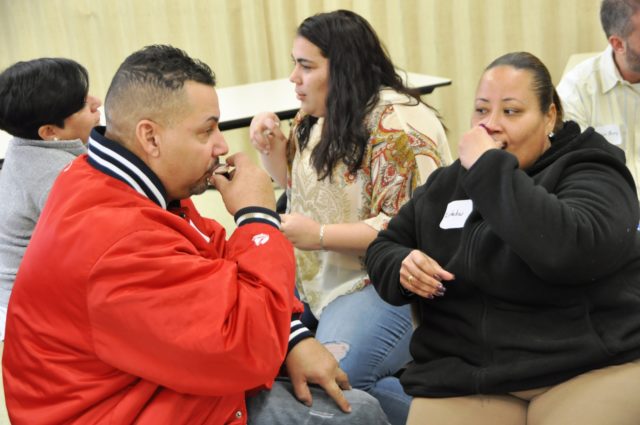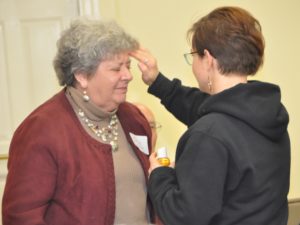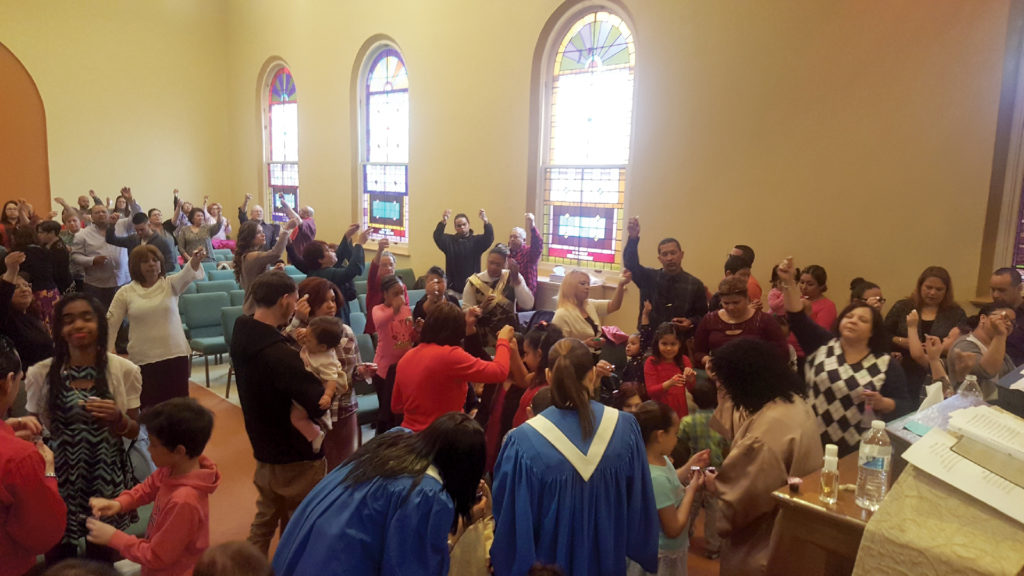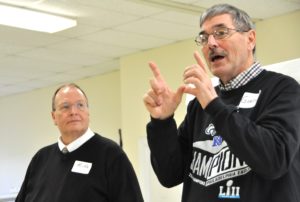
Ironically, while two groups in the Eastern PA Conference were considering The United Methodist Church’s future—and the work of its Way Forward Commission—on Jan. 27, another group was trying to recover some of its past—namely, sacramental practices of early Methodists and even the first Christians in the Bible’s Book of Acts.
Bishop Peggy Johnson convened members at St. Matthew’s UMC in Valley Forge to explore best ways to dialogue peaceably and productively about the denomination’s stance on human sexuality and church law. Meanwhile, conference members involved in the conservative Wesleyan Covenant Association welcomed its president, the Rev. Keith Boyette of the Virginia Conference, to come speak on that same topic and the church’s uncertain future at Hemphill UMC in Lancaster.
But another event at nearby Salem UMC in Manheim was all about the Holy Spirit—that force of God’s nature that birthed the church, inspiring Jesus’ disciples at Pentecost and early Methodists in America. The Revs. Gordon Hendrickson, Conference Coordinator of Congregational Development, and Mike Netznik, chair of the Congregational Development Team (CDT), led about 60 people—mostly laity—in exploring “The Four Stations of the Holy Spirit.”
 Those “four stations” are where empowered laity can offer Prayer, Anointing with oil, affirmation of Baptism and/or Holy Communion with consecrated bread and wine to fellow members in the church or even to others outside the church.
Those “four stations” are where empowered laity can offer Prayer, Anointing with oil, affirmation of Baptism and/or Holy Communion with consecrated bread and wine to fellow members in the church or even to others outside the church.
The CDT tag team led a six-hour exposition on renewing sacred and sacramental practices of what some consider the once and future church of Acts. They called for the deployment of more lay disciples to help “spread holiness throughout the land” with clergy-authorized sacraments to celebrate new life in Christ with others.
“As an elder for 25 years, I’ve learned that everybody can have the gift of the Holy Spirit and anybody can help grow the Body of Christ if God wants you to,” Hendrickson proclaimed to his audience. He decried the notion of elders being “spiritually superior” and recalled early American Methodism when the few existing, traveling preachers had to consecrate sacramental elements for laity to administer in their absence.
The retired pastor, who has coordinated Conference Congregational Development support for six years, offered a primer on sacramental theology and then gave attendees copies of the Rev. Bill Hybels’ 2013 book Too Busy Not to Pray. Few if any hands were raised when he asked how many people frequently experience Holy Communion, or anointing prayer or affirmation of their Baptism.
‘Why don’t you turn the Holy Spirit’s power loose?’
“Are you seeing the problem here?” he chuckled. “This is mind-boggling to me. If I miss Communion on first Sunday, I may have to wait weeks for another chance. And don’t you think we should anoint people before they go to the hospital for healing or if they’re having trouble in their marriages and need confession?
“Why not offer these things all the time at church, or in your small groups or other gatherings?” Hendrickson asked. “Why don’t you turn the power of the Holy Spirit loose? What’s wrong with us as a church? We’re keeping the greatest power we have locked up.
“And then the next step is, how do we take that power out into the world to people who are struggling?… Maybe a person might never come into your church; but you can take the power of the Holy Spirit to them, right?”
Netznik shared his own application of these ideas as pastor of Covenant UMC in Moore Township. While he greets some worshipers at the door on Sundays after worship, members are ministering to others who need anointing prayer or Communion at the altar. And some have done so out in the community as well.
“We hold in our hands and hearts people’s lives that just need to be blessed,” Netznik said after attendees practiced praying, anointing and sharing Communion with one another. He gave them each separate, small bottles of consecrated water and oil and challenged them to empty those bottles soon in service to others.

About a dozen members of New Birth (Nuevo Nacimiento) UMC in Lebanon attended the Four Stations of the Holy Spirit training and then put what they learned into action during a recent worship service. “Children prayed for their parents, and parents prayed for children,” reported the Rev. Elena Ortiz, pastor. “We prayed for a paralytic. One person accepted Jesus as their personal Lord and Savior, and three reconciled with God. We could feel the presence of the Holy Spirit in such an amazing way. That workshop has been a blessing.”

